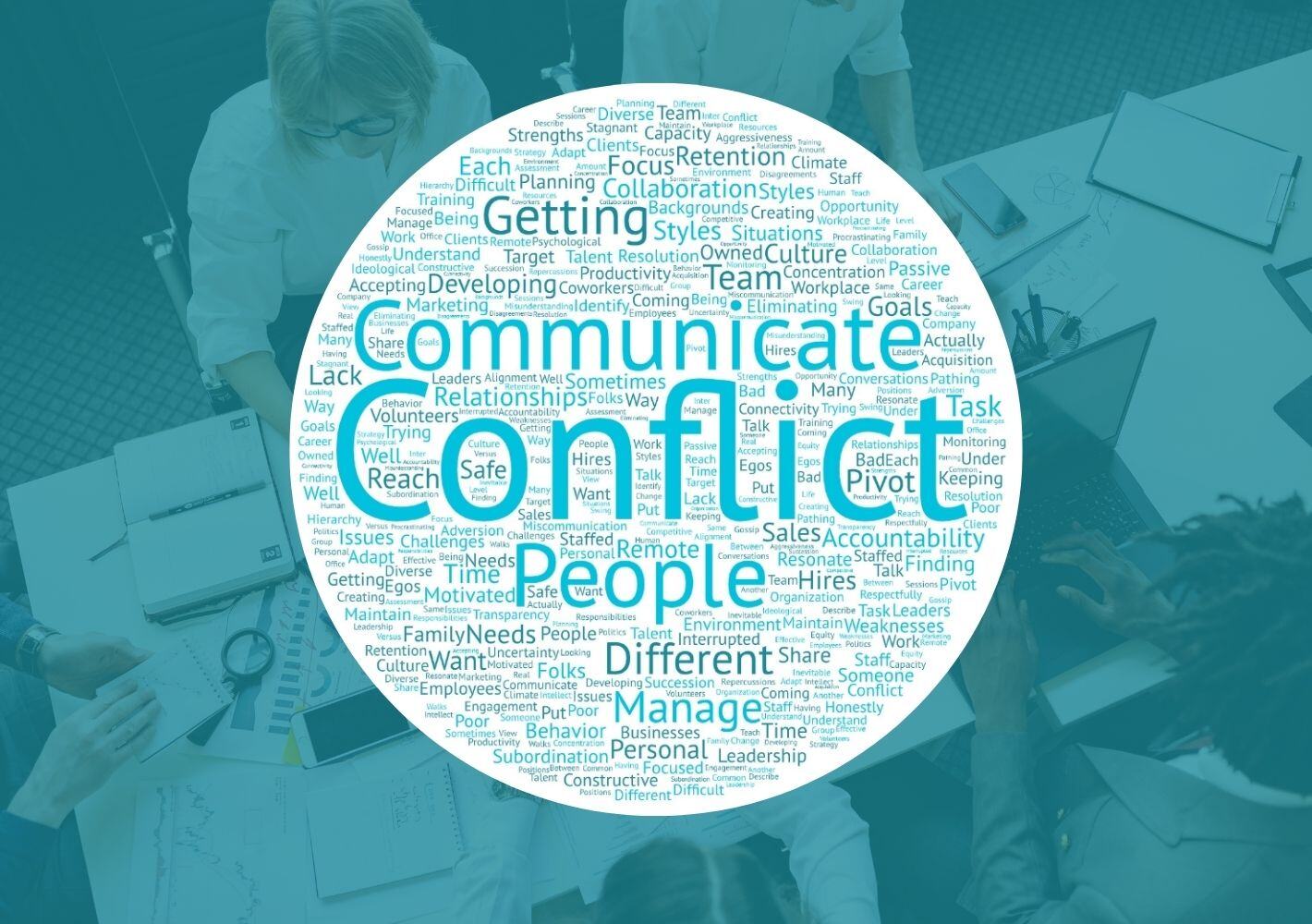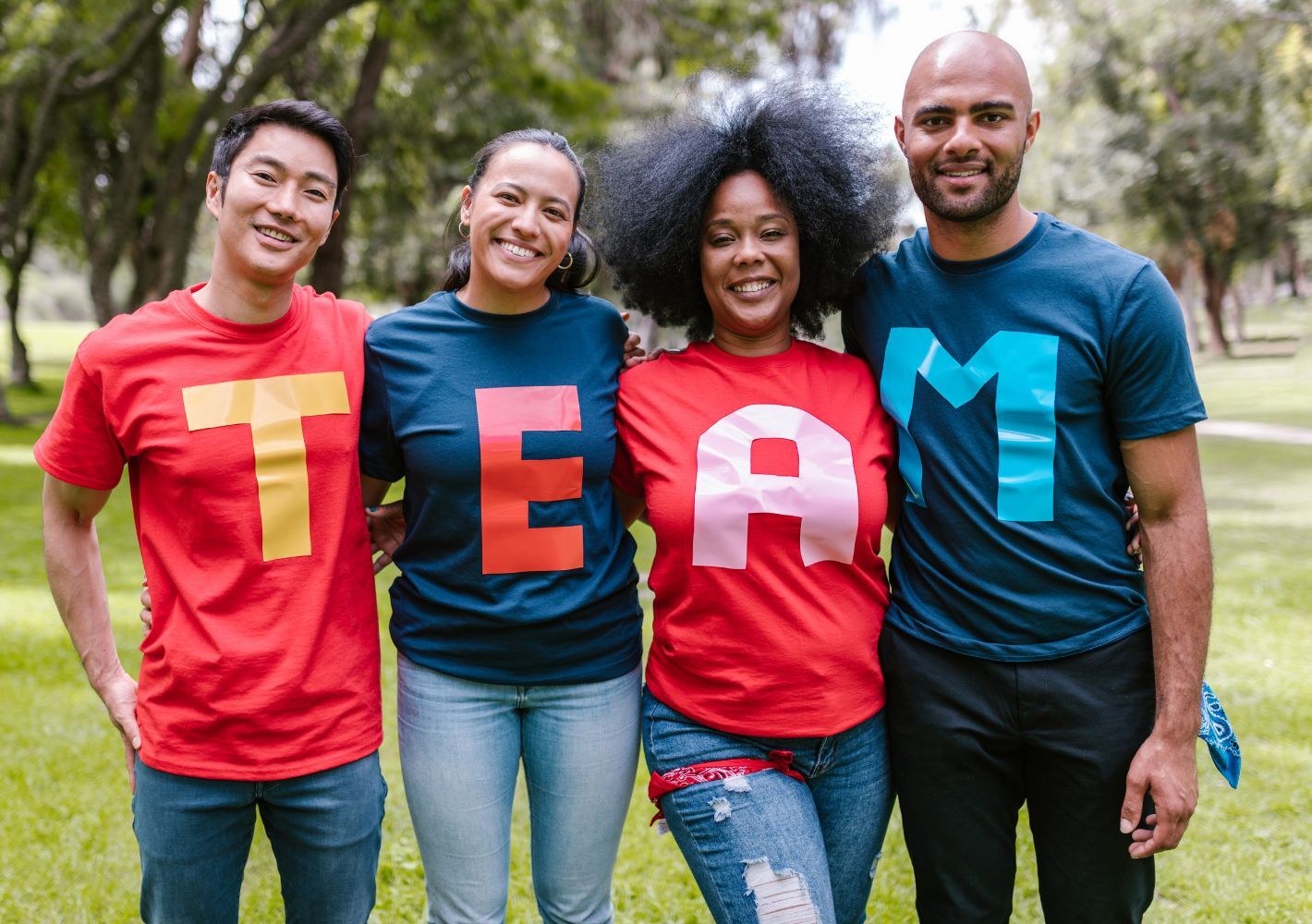Today's workplaces face an ever-growing array of challenges that can deeply affect productivity, employee morale, and overall success. Issues such as communication breakdowns, unresolved conflicts, complex team dynamics, and leadership development hurdles can significantly hinder organizational growth and effectiveness. By analyzing responses we collected from our recent eBook on conflict management, we identified the top 10 pressing challenges.
In this blog, we’ll delve into these challenges and demonstrate how PeopleKeys DISC, along with our other assessments—TEAMS, VALUES, and BAI—offer practical and effective strategies for addressing and overcoming them.
Conflict
Many workplaces struggle with unaddressed conflicts, which can foster a toxic environment and undermine team cohesion. When conflicts remain unresolved, they often escalate, affecting morale and productivity, and creating a climate of mistrust and dissatisfaction. Addressing and resolving these issues proactively is essential for maintaining a positive and effective work atmosphere.
DISC is a powerful tool for conflict resolution, as it helps individuals understand the root of their own reactions and those of others. By recognizing the behavioral styles at play, such as a Dominant style potentially clashing with a Steady style, DISC provides strategies for diffusing tension and promoting understanding. For instance, DISC can guide a more Dominant individual to approach conflicts with a softer touch or encourage an Influential person to listen more actively.
TEAMS further enhances conflict resolution by identifying the roles individuals naturally take within a team, helping to address team dynamics that may contribute to conflicts. BAI can uncover hidden attitudes exacerbating conflicts, allowing for targeted interventions that go beyond surface-level solutions.
Communication
Another major concern in the workplace is communication. Ineffective communication frequently results in misunderstandings, conflicts, and a noticeable decline in productivity. When team members and leaders fail to communicate clearly and efficiently, it can result in misaligned goals, fragmented collaboration, and unresolved issues. These communication breakdowns not only create a tense work environment but also hinder the organization’s ability to function smoothly and achieve its objectives. Ensuring that communication channels are open, transparent, and effective is crucial for maintaining a harmonious and productive workplace.
DISC is foundational in understanding communication styles. By identifying whether someone is Dominant, Influential, Steady, or Conscientious, DISC helps individuals and teams recognize and adapt to different communication preferences. For example, a Dominant style may prefer direct and concise communication, while a Steady style might appreciate a more empathetic approach. By tailoring communication strategies based on DISC profiles, teams can minimize misunderstandings and foster clearer, more effective interactions.
VALUES adds another layer by revealing the core motivations behind these communication styles, while BAI provides insights into the attitudes that shape how people communicate, enabling teams to align better and reduce friction.
Leadership Development
Developing effective leaders who can successfully guide teams and drive organizational success is a common and significant challenge. Leaders must possess a blend of vision, interpersonal skills, and strategic thinking to inspire and manage their teams effectively. Without strong leadership, organizations may struggle with direction, motivation, and achieving their goals, making it crucial to invest in leadership development and support.
DISC is essential for leadership development as it provides leaders with a deep understanding of their own style and how it impacts their leadership approach. A leader with a Dominant style, for example, may need to develop more patience and empathy, while an Influential leader might work on becoming more detail oriented. DISC equips leaders with the tools to adapt their style to meet the needs of their team members, fostering a more inclusive and effective leadership approach.
VALUES complements DISC by providing insights into what motivates leaders and how they align with organizational goals. TEAMS helps leaders understand team dynamics, enabling them to build and manage high-performing teams by leveraging individual strengths and dynamics.
Team Building
Creating cohesive teams that collaborate effectively can be challenging, especially when team members possess diverse personalities and working styles. These differences can lead to misunderstandings and friction if not managed properly. By understanding and leveraging each team member's unique traits, leaders can build a harmonious team environment where diverse skills and perspectives contribute to collective success.
DISC is a powerful tool for team building, as it reveals each member’s unique strengths and potential challenges. By understanding individual DISC profiles, leaders can craft balanced teams where different styles complement each other. For example, pairing a Conscientious team member with a more Influential one combines meticulous planning with creative thinking, thereby enhancing overall team performance. DISC also promotes greater empathy and understanding among team members, leading to improved collaboration.
TEAMS takes team building a step further by analyzing team dynamics and optimizing collaboration. VALUES helps teams align on shared goals and priorities, fostering a unified approach to projects. Additionally, the Group Dynamics Report provides insights into team working styles under normal conditions and under stress. This report can be used for strategic planning, guiding leadership, or as a team-building exercise to enhance understanding and collaboration within the team.
Employee Retention
Retaining top talent is crucial for maintaining organizational continuity and minimizing turnover costs. High employee turnover can disrupt operations, hinder team dynamics, and incur significant recruitment and training expenses. By focusing on strategies that enhance employee satisfaction and engagement, organizations can ensure that they keep their best performers, fostering stability and sustained success.
DISC plays a critical role in employee retention by helping managers understand the needs and preferences of their team members. By recognizing the DISC styles of employees, managers can tailor their approach to provide the support and environment that each individual needs to thrive. For instance, a Steady employee might value job security and consistency, while a Dominant employee might be motivated by opportunities for advancement. Addressing these needs can lead to higher job satisfaction and retention.
VALUES enhances this by aligning employees' personal values with organizational culture, increasing engagement and loyalty. BAI can reveal any underlying dissatisfaction that might lead to turnover, allowing organizations to address issues proactively.
Hiring and Talent Acquisition
Finding the right fit for a role is crucial yet challenging, particularly in high-volume recruitment scenarios. With numerous candidates to evaluate, the risk of hiring mismatches increases, potentially impacting team performance and organizational efficiency. Effective screening and assessment processes are essential to identify candidates who not only meet the job requirements but also align with the organization's culture and values.
DISC is highly effective in the hiring process by identifying candidates whose behavioral styles match the demands of the role. For example, a Dominant style might be ideal for a leadership position, while a Conscientious style might excel in a role requiring attention to detail. Using DISC in hiring helps ensure that new hires not only have the right skills but also fit well with the team and organizational culture.
TEAMS assessment can further enhance this process by identifying how potential hires might fit into existing team dynamics. BAI helps assess candidates' attitudes toward key job functions, ensuring alignment with organizational needs and culture.
Additionally, PeopleKeys offers a benchmarking feature that lets you use our proprietary occupational benchmarks or input your own custom benchmarks. This functionality helps you replicate the success of your top performers by comparing these benchmarks with assessment reports, allowing you to make well-informed decisions about the best fit for each position.
Accountability
Holding employees accountable while maintaining a positive work environment can be tricky and requires a delicate balance. Ensuring that accountability measures are clear and fair, while also fostering a supportive and constructive atmosphere, is essential for both employee satisfaction and organizational effectiveness. Effective leadership and communication strategies play a key role in managing this balance, ensuring that employees are motivated to meet expectations without feeling undermined or demoralized.
DISC aids in understanding how different personalities perceive and respond to accountability. A Dominant style may embrace accountability as a challenge, while a Steady style may require more support and reassurance. By using DISC, managers can tailor their approach to hold employees accountable in a way that resonates with their behavioral style, fostering a culture of responsibility without creating friction.
VALUES provides insights into what drives employees' sense of responsibility and commitment, enhancing the effectiveness of accountability strategies. BAI can further uncover attitudes that impact accountability, allowing managers to implement strategies that encourage ownership and follow-through.
Cultural Alignment
Ensuring that diverse teams are aligned with the organization's culture and values can be challenging, particularly when team members come from varied backgrounds and have different perspectives. This alignment is crucial for fostering a unified and cohesive work environment where everyone feels connected to the organization’s mission. Effective integration of diverse perspectives while maintaining a consistent cultural framework requires deliberate efforts in communication, training, and inclusive practices.
DISC helps identify how different behavioral styles align with organizational culture, allowing for better integration and cohesion within teams. By understanding DISC profiles, organizations can ensure that individuals are not only culturally aligned but also positioned in roles that suit their behavioral tendencies. This alignment leads to a more harmonious work environment and better overall performance.
VALUES is key to understanding individual and team alignment with organizational culture, ensuring that everyone is working toward the same goals. TEAMS also helps to respect and leverage cultural differences, enhancing team cohesion and success.
Change Management
Navigating change can be challenging, particularly when employees resist new processes or directions. This resistance often stems from discomfort with uncertainty or fear of the unknown, which can undermine the effectiveness of the change initiative. Successful change management requires clear communication, ongoing support, and strategies to address concerns and build buy-in, ensuring that employees feel confident and engaged throughout the transition.
DISC is instrumental in change management by helping leaders understand how different styles respond to change. For instance, a Conscientious style might resist change due to a preference for stability and predictability, while an Influential style might embrace it for the opportunity to innovate. By using DISC, leaders can tailor their approach to managing change, addressing concerns, and motivating different personality types effectively.
BAI helps identify underlying attitudes toward change, allowing leaders to address resistance more effectively. VALUES can support leaders in aligning change initiatives with employees' core motivations, making transitions smoother and more successful.
Motivation and Engagement
Keeping employees motivated and engaged is critical for maintaining high productivity and morale within an organization. When employees are enthusiastic about their work and feel connected to the organization's goals, they are more likely to put forth their best effort and contribute positively to the team. Achieving this requires a combination of recognition, meaningful work, opportunities for growth, and a supportive work environment that aligns with employees' values and aspirations.
DISC helps identify what drives and motivates different behavioral styles. For example, a Dominant style may be motivated by challenges and opportunities for advancement, while a Steady style may value a supportive and consistent work environment. By understanding these drivers, managers can create tailored engagement strategies that resonate with each employee, boosting morale and productivity.
VALUES assessment helps identify what truly drives employees, enabling managers to tailor engagement strategies that align with their core motivations. BAI can provide insights into attitudes that might be hindering motivation, allowing for targeted interventions that ensure a more engaged and motivated workforce.
Workplace challenges are inevitable, but with the right tools and insights, they can be managed effectively. PeopleKeys is here to help you turn these challenges into opportunities for growth and success. If you have any questions, contact our Customer Support team to learn more about how our DISC-based solutions can benefit your organization.






